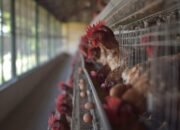As the world grapples with the escalating effects of climate change, scientists issue a stark warning: the cost of food is expected to rise annually. This trend, driven by increasing global temperatures, threatens to exacerbate food insecurity and widen the gap between rich and poor.
A recent study by German researchers predicts that food prices could surge by up to 3.2% per year due to climate change. This inflation is a direct consequence of higher temperatures affecting crop yields, shifting seasons, and the spread of pests and diseases. The impact is global, but countries in the global south, particularly in Africa, will bear the brunt despite contributing the least to the causes of climate change.

The situation in Ghana exemplifies the dire consequences, with a significant portion of the population experiencing food insecurity. The Intergovernmental Panel on Climate Change has identified West Africa as a “hotspot” for climate change, with predictions of extreme temperature rises and reduced rainfall.
The Economic Divide
The predicted rise in food prices will not only affect the availability of food but also its affordability. As food costs increase, households will have to allocate a larger portion of their income to sustenance, deepening economic disparities. The disparity will be most pronounced in low-income countries, where people already spend a higher percentage of their income on food.
This economic divide will challenge global efforts to combat hunger and malnutrition. It calls for an urgent reassessment of agricultural practices and food distribution systems to ensure resilience in the face of climate change.
Policy Implications and Actions
The forecasted increase in food prices necessitates immediate action from policymakers worldwide. Strategies to mitigate the effects of climate change on agriculture, such as investing in sustainable farming techniques and improving food storage and distribution infrastructure, are critical.
Moreover, there is a pressing need for international cooperation to support the most vulnerable populations. Policies that promote food security, such as subsidies for essential food items and support for smallholder farmers, can play a pivotal role in cushioning the blow of rising food costs.
















